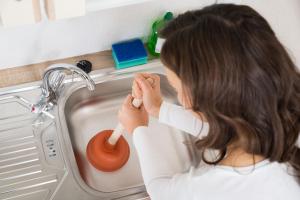At Lanes for Drains we receive calls every day from home and business owners complaining of blocked pipes and drains. While some are caused by unavoidable situations, such as storms and flooding, many are caused by people disposing of items and unsuitable substances down the sink or toilet.
In this piece, we discuss some of the most common offenders that cause blockages of pipes and drains, which can lead to significant stress and expense for home and business owners.
Fats, oils and grease (FOG)
This is one of the biggest problems in the drainage world. Because oils and grease are often liquid in form, people assume that it is safe to pour them down the sink. Once they have been poured down the drain, they actually solidify, which can result in pollution, blockages and even flooding. Fats, oils and greases are such a common cause of blockages that we wrote a guide to disposing of fat.
So, how should people dispose of FOG? When getting rid of oil, let it cool down first (to avoid burning through the bin or bin-bag) and then dispose of it in the bin. Wipe greasy pots and pans with a paper towel before washing up.
Hair - this creates mainly internal blockages in u bends rather than external blockages
It’s a nasty job, but in the long run, clearing hair out of the plug hole on a regularly basis could save a lot of money and hassle on unblocking drains further down the line. Although single strands of hair aren’t going to cause a problem, over time as they build up and mix with other substances they can cause problematic blockages.
An easy way to prevent this is to regularly clean out the hair in the shower, sinks and baths and even try using a ‘hair catcher’, which sits over plug holes and prevents the hair from entering the drainage system.
Sanitary products
According to The Guardian, almost half of women in the UK flush tampons down the toilet. This is particularly worrying, because all sanitary products cause blockages, including tampons.
Homeowners should ensure there is a bin in the bathroom to prevent guests from flushing wipes down the toilet, or considering doing something that a lot of commercial properties do and display signs reminding women not to flush sanitary products down the toilet.
‘Flushable’ wipes
Wipes are a real problem in the drainage industry at the moment. Some brands are marketing their wipes as ‘flushable’, even though they are known to cause blockages. In an ideal world wipes should never be flushed down the toilet - they are incredibly problematic and cost utilities companies millions of pounds each year to fix.
To be on the safe side, all wipes should be binned rather than flushed. Again, having a bin handy can stop people from flushing items that are known to cause drainage problems.
Leaves
There are common causes of surface water drainage issues outside too. Leaves are a common cause of blockages, particularly in the autumn, with the combination of falling leaves and heavy rain often resulting in urgent call-outs for our teams. Property owners should try to make time to clear all gutters and drains on and around their property to prevent build-ups, especially if wet weather is forecast.
The Dirty Dozen
Because avoidable blockages are so common, Lanes for Drains has a list of the most common items that cause blockages, which they call ‘The Dirty Dozen’.
In no particular order they are:
Food waste
Fat, oil and grease
Plastic bags
Nappies
Sanitary towels including tampons, applicators and wrappers
Cotton buds
Condoms
Bandages and plasters
Baby wipes
Medicines, needles and syringes*
Cleaning wipes
Razor blades
*These should be taken to your local pharmacy or health authority for safe disposal
Not only is unblocking drains and sewers a time-consuming and costly exercise for home and business owners, it also has the potential to damage the environment by polluting surrounding rivers and poisoning their wildlife.
By raising awareness of these issues and showing the public how they themselves directly affect the state of the drainage and sewer systems, as well as the environment, we hope people will start to think twice about what’s going down their toilets or sinks.



Add new comment